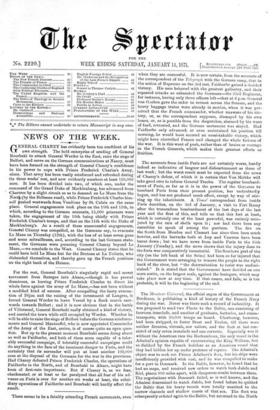For the rest, General Bourbaki's singularly rapid and secret movement
from Bourges into Alsace,—though it has proved disastrous, as leaving Prince Frederick Charles to direct his whole force against the army of Le Mans,—has not been without a modified kind of success. After compelling the hasty evacua- tion of Dijon and the raising of the investment of Langres, it forced General Werder to leave Vesoul by a flank march east- wards towards Belfort ; and it is now obvious that in the battle of Villersexel, General Bourbaki really obtained a kind of victory, and carried the town while still occupied by Werder. Whether he will be able to raise the siege of Belfort before the German reinforce- ments and General Manteuffel, who is now appointed Commander of the Army of the East, arrive, is of course quite an open ques- tion. But up to the present moment Bourbaki seems doing about as well as Faidherbe, and both of them seem capable of a toler- ably successful campaign, if tolerably successful campaigns could do anything in the face of the imminent danger to Paris, and the certainty that its surrender will put at least another 100,000 men at the disposal of the Germans for the war in the provinces. Had Chanzy defeated Prince Frederick Charles, the operations of Faidherbe in the North, and of Bourbaki in Alsace, might have been of first-rate importance. But if Chanzy is, as we fear, checkmated, or at least so far paralyzed that all fear of his ad- vance on Paris is over for another six weeks at least, the subsi- diary operations of Faidherbe and Bourbaki will hardly affect the result.


































